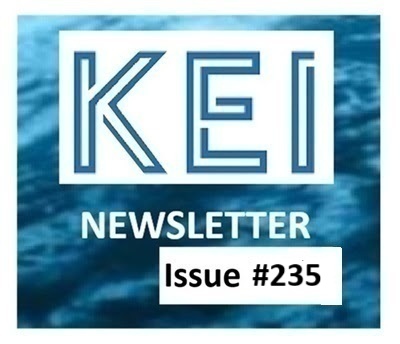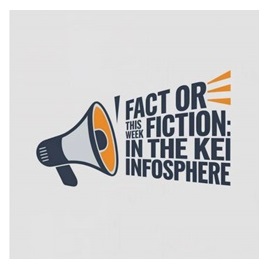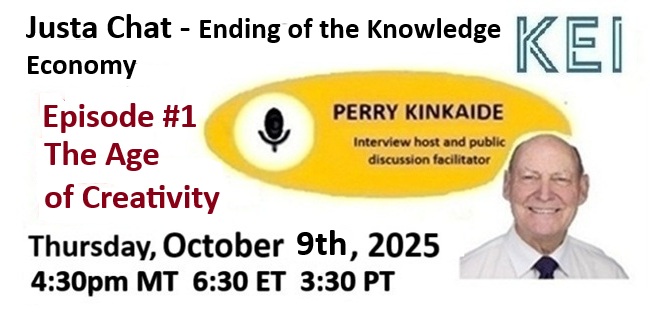|
The Age of Creativity (Episode #1) - Ending the Knowledge Economy |
DIRECTORY | ||
|
Contributions: AI and OUR Future - The AI Engine: Design, Development, and Destiny HERE |
Action: Help sustain KEI's contributions |
Fact or Fiction?
AI Bubble About to Burst HERE Canada - A Smart Move HERE |
|
|
Editor - Perry Kinkaide |
For decades, the knowledge economy defined success through expertise, information, and credentials. But Artificial Intelligence has disrupted that foundation. AI doesn’t just access knowledge—it creates it, rivaling human experts across law, medicine, education, and more. The work of “knowing,” once our monopoly, is no longer uniquely human. What remains? Creativity. Not as an afterthought, but as the new engine of value. EXPRESS YOUR VIEW - HERE. |
||
|
In this emerging economy, imagination, synthesis, and reinvention are our greatest advantages. Neuroscience confirms this shift: creativity arises from blending logic and imagination, fueling breakthroughs across design, art, architecture, and technology. Already, UNESCO estimates the creative economy sustains over 48 million jobs worldwide. The Age of AI marks a sharp discontinuity—much like the Age of Reason before it. The challenge now is not just to keep up with machines, but to build a future where creativity defines human flourishing. — Editor |
|||
|
AI Just Ended the Knowledge Economy. Welcome to the Age of Creativity For the last several decades, we have built our prosperity on a simple premise: knowledge is power. The "knowledge economy" defined success through professional expertise, the command of information, and the credentials earned from institutional learning. We were taught that the path to a stable, successful life was paved with accumulated facts and specialized skills. A great unraveling. Today, we are living through the collapse of that premise. The cause is not another incremental technology but a profound discontinuity: the Age of AI. Artificial intelligence is no longer a passive tool for accessing information; it has become an active participant in creating it. It can store, analyze, and now generate complex text, images, code, and music with a proficiency that challenges human experts. Continued below
No need to register. Just Zoom in https://us02web.zoom.us/j/84258596166?pw..
KEI is hosting a webinar featuring your voices from neuroscience, the arts, technology, and education. Together, we will explore Creativity as core to the emerging economy:
This webinar will set the stage for the month ahead, as participants imagine, question, and contribute to building a future where creativity becomes not a luxury, but the foundation of economic and social resilience. Continued from above A sharp discontinuity. The "Knowledge Economy" is ending, and it is not a slow fade. Human history is marked by disruptive breaks: the Age of Reason shifted authority from dogma to reason, remaking society in the process. We are now in another such moment. This is not evolution but rupture—every bit as transformative as the revolutions of the past. AI as replacement. The difference today is that AI is no longer just a tool to be commanded. By analyzing and generating information, it disrupts the very foundation of the economy we have spent half a century building. In law, medicine, education, and journalism, functions once requiring years of human mastery are being replicated by machines. The human premium. If knowledge can be automated, what remains distinctly human? The answer is creativity. Neuroscience shows it as synthesis: the fusion of logic and imagination, the blending of hemispheres that gives rise to originality. This is why the new economy demands not just knowledge transfer but the fusion of art and science, whimsy and rigor, storytelling and systems. Richard Florida’s insight. In The Rise of the Creative Class, Florida demonstrated that cities thrive when they nurture arts, culture, diversity, and openness. Creativity, he argued, is not ornamental but foundational to prosperity. As the knowledge economy fades, the very ecosystems he described—where imagination, culture, and expression flourish—become the engines of future growth. The limits of communication. The systems we built to serve the knowledge economy excelled at transmitting information, yet fell short of conveying emotion or inspiring creativity. The arts, by contrast, have always carried their own form of messaging—symbolic, emotional, and transformative. The world now emerging will merge these two streams, combining precision in knowledge with the expressive force of art to spark creativity as an emergent process. An economic engine already at work. UNESCO reports that the creative economy sustains over 48 million jobs worldwide, and the World Economic Forum ranks creativity as one of the most critical skills for the future workforce. From generative design to gaming, architecture, and sustainable materials, the blend of imagination with science is already reshaping industries. The lifelong arc of creativity. Resilience, curiosity, and reinvention will define the most valuable traits in this economy. They are cultivated first in childhood play and imagination, then reinforced through education that integrates arts and sciences, and finally sustained in adulthood through lifelong learning and innovation. Redefining our relationship with ourselves. The Age of Reason redefined humanity’s relationship with the universe. The Age of AI is redefining humanity’s relationship with itself. As machines take on the work of knowing, the challenge before us is clear: will we invest in cultivating the work of creating—in our schools, our companies, our cities, and our own lives?
Help define the next chapter of Canada's AI leadership
Canada helped invent modern AI. To stay a leader—and protect our digital sovereignty, We are running a 30-day national sprint to shape a renewed AI strategy. We are inviting founders, researchers, workers, creators, students, public servants, and community voices to weigh in. Since 2017, Canada's Pan-Canadian AI Strategy has invested in research, talent, standards, and commercialization. In 2024, the Canadian Sovereign AI Compute Strategy strengthened access to secure, made-in-Canada compute. This engagement builds on that progress to identify the next set of priorities. Tell us where Canada should focus to:
Respond by October 31st to the SURVEY HERE or submit your comment by email to ised-isde@ised-isde.gc.ca.
|





